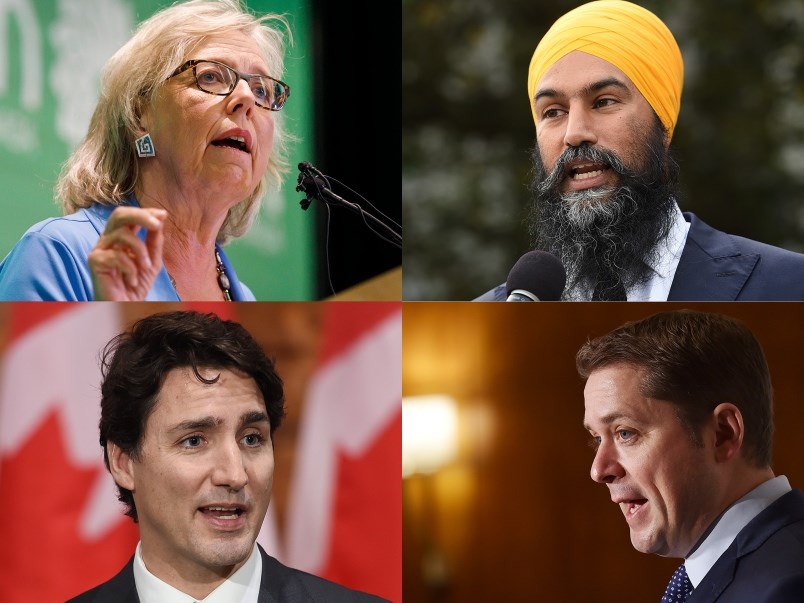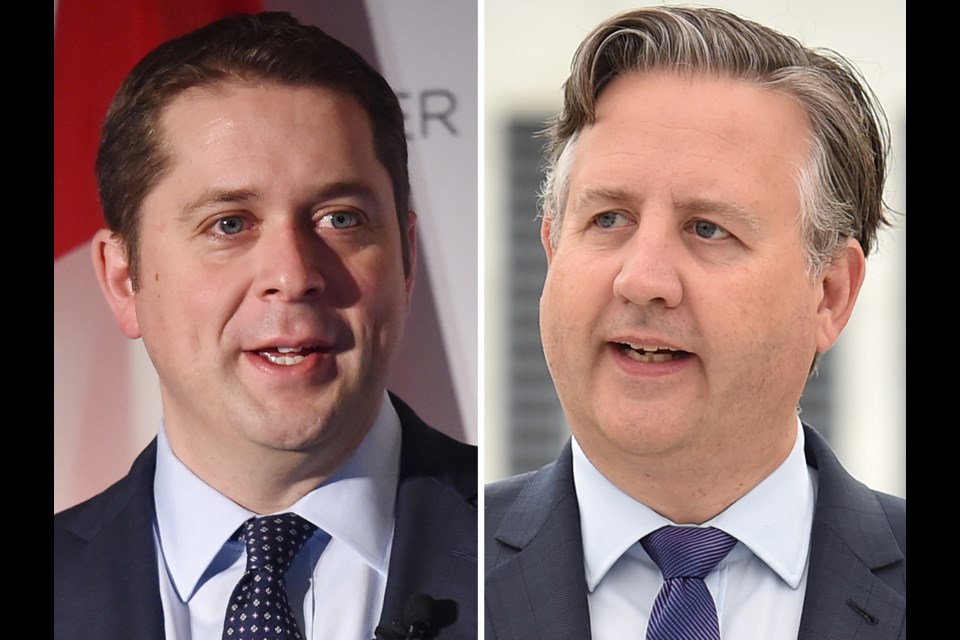Mayor Kennedy Stewart inserted himself into the federal election campaign Wednesday in a big way by suggesting that Conservative leader Andrew Scheer would be “a disaster for the city” if elected prime minister.
Stewart, who served for seven years as an NDP MP in Burnaby before resigning to take an independent run for mayor last fall, read from a prepared two-minute script at a news conference at city hall.
“This is a critical election for Canadians, and I’m worried — I’m worried that an Andrew Scheer Conservative government could be elected, and this would be a disaster for the city,” the mayor told reporters.
In making such a pronouncement, the mayor said he read the Conservatives’ platform and concluded the party has not committed to build more affordable housing for Vancouver, extend the SkyTrain to the University of B.C. or take measures to combat the opioid crisis.
Stewart also based his conclusion on Generation Squeeze’s analysis of the 2019 federal election housing platforms and a similar review of the parties’ transit infrastructure funding commitments, which was conducted by staff at the Mayors’ Council on Regional Transportation.
On housing, Stewart said he was worried the Conservatives would rely on the private market and not government investment to create more affordable housing programs attractive to developers.
“We already know that we have probably the most privatized market in the world, and the market’s not going to bail us out on this,” he said.
Stewart then referred to the former Trudeau government’s announcement in August that commits $184 million towards the construction of 1,100 homes targeted at households earning between $30,000 and $80,000.
“I want to keep that rolling.”
The Conservatives have promised to make home ownership “more affordable” and amend the previous Liberal government’s mortgage stress test to ensure first-time home buyers can get a mortgage.
Scheer’s party also promised to increase amortization periods on insured mortgages to 30 years for first-time buyers to lower monthly payments.
An inquiry into money laundering in the real estate sector and making surplus federal real estate available for development to increase the supply of housing are other measures.
On transit, the mayor pointed to Scheer’s recent announcement that he would roll back infrastructure funding, which Stewart pegged at $18 billion and claimed such a cut “would kill the SkyTrain to UBC.”
The Conservatives say they will keep the $187-billion infrastructure program announced by the former Justin Trudeau government, but spread the spending over 15 years instead of 12.
Scheer also responded to the region's mayors in an Oct. 14 letter, saying that a Conservative government would prioritize "infrastructure projects, like transit, that reduce congestion and gridlock, and get people moving."
On the opioid crisis, the mayor referred to Scheer’s comments made to media that strongly favour an abstinence-based approach to drug addiction. Scheer has rejected calls for decriminalization or changing laws to allow a safe supply of drugs for chronic users.
'Worse than Stephen Harper'
The mayor repeatedly said Scheer as prime minister “would be worse than Stephen Harper,” referring to the former Conservative prime minister’s years-long unsuccessful court battles to shut down the Insite supervised drug injection site on East Hastings.
Stewart’s predecessor, Gregor Robertson, was a constant critic of the Harper government regarding its legal action related to Insite.
Robertson also argued the Conservatives didn’t have a national housing strategy, or an interest in helping pay for the Broadway subway — which the Liberals did after getting elected in 2015.
The Liberals also announced a $40-billion, 10-year housing strategy that aimed to end chronic homelessness by 50 per cent across the country, although Vancouver’s homeless population continues to rise year over year.
“I want to be clear,” Stewart said, “I’m not telling people who to vote for, but I do want to let people in Vancouver know that if you care about these top issues — housing, opioids and transit — and I know most people do, Andrew Scheer would be worse than Stephen Harper.”

He pointed out that leaders from Canada’s other three mainstream parties — Trudeau of the Liberals, Elizabeth May of the Greens and Jagmeet Singh of the NDP — all agreed to meet with him over the past three months.
He came away from those meetings pleased with what he heard.
“I feel confident that whatever configuration comes out of this election – as long as it’s not Andrew Scheer as prime minister – Vancouver would be in better shape,” he said.
Stewart said his staff reached out to Scheer’s office and made multiple requests via members of the Conservative Party to meet with him, but Scheer refused. He didn’t provide a reason, the mayor added.
Wai Young responds
Wai Young, the Conservative candidate for Vancouver-South who ran against Stewart in the 2018 mayors’ race, said in an email to the Courier Wednesday that she was disappointed in the mayor’s criticisms of Scheer and the party.
“These comments are very disappointing, unprofessional and don’t help Vancouverites get ahead,” said Young, who often referred to Stewart during the mayoral campaign as “a socialist.”
“Vancouverites and Canadians don’t want hyper-partisan and divisive politics. They expect all levels of government to work together for their benefit.”
Added Young, who is attempting to get her seat back from Liberal incumbent Harjit Sajjan: “I remember when those in government believed it was their job to make life better, more convenient and more affordable for us — and I’m working to do just that. The Conservative Party has already promised to honour existing infrastructure projects.”
Stewart has not made it a secret that he voted in the NDP’s nomination race in Vancouver-Centre — where he lives and ran in 2004 against the Liberals’ Hedy Fry — and has campaigned in this election for former House of Commons seat mate, Jenny Kwan, in Vancouver-East. NDP leader Singh also took over Stewart's former riding in Burnaby.
He acknowledged his criticisms of Scheer and the Conservatives could be seen as purely partisan, and that he was simply helping out his NDP friends in the remaining days of the campaign.
But, he said, "It’s one of those kinds of jobs. You’re always going to get accused of partisanship, but in this case we’ve had analysis on all the platforms.”
Asked whether he was worried that his comments could prove to be damaging for the city — if Scheer wins — Stewart replied:
“I think our relationship is already cooked. I think that this is the best thing I can do is warn Vancouverites what’s coming, if he becomes prime minister and that he would be worse than Stephen Harper.”
Stewart held his news conference Wednesday without any of his council colleagues present.
City councillors support mayor
Green Party Coun. Pete Fry, whose mother is Hedy, said he was anxious about the prospect of a Conservative government “because I don’t think it’s going to be thoughtful and really working for better cities.”
In Fry’s review of the Conservatives’ platform, he zeroed in on the same issues Stewart stated as priorities for the federal government to address — creating affordable housing, investing in transit and combatting the opioid crisis.
“Their platform is so chockablock with pretty significant cuts to infrastructure and transit and stuff that we really need for cities,” he told the Courier.
“And when we look at some of the most gripping issues for our cities — like the opioid crisis, transit, housing, climate change — I don’t see a Conservative government as being terribly responsive to that.”
Added Fry: “I’m at a point where I’m ready to urge any Vancouverite who has family in the rest of Canada to ask them please to consider our cities when they’re voting. Because this election may well come down to a cities versus rural kind of voting pattern.”
OneCity Coun. Christine Boyle said in an email Wednesday that she agreed with the mayor’s public criticisms of Scheer and the Conservatives
She wrote that a Scheer-led government “would make it harder to achieve what residents of Vancouver elected us to do.”
Stewart’s comments were reminiscent of then-Vancouver mayor Larry Campbell’s description of the Conservatives as “barbarians” in the 2004 federal election campaign.
Campbell slammed the party, saying it would set Canada’s cities back 20 years. Campbell is now a senator in Ottawa.
The election is Oct. 21.
Note: For more on Stewart's lobbying of the federal leaders, and some of their responses, you can read a Courier feature posted Sept. 30.
@Howellings



